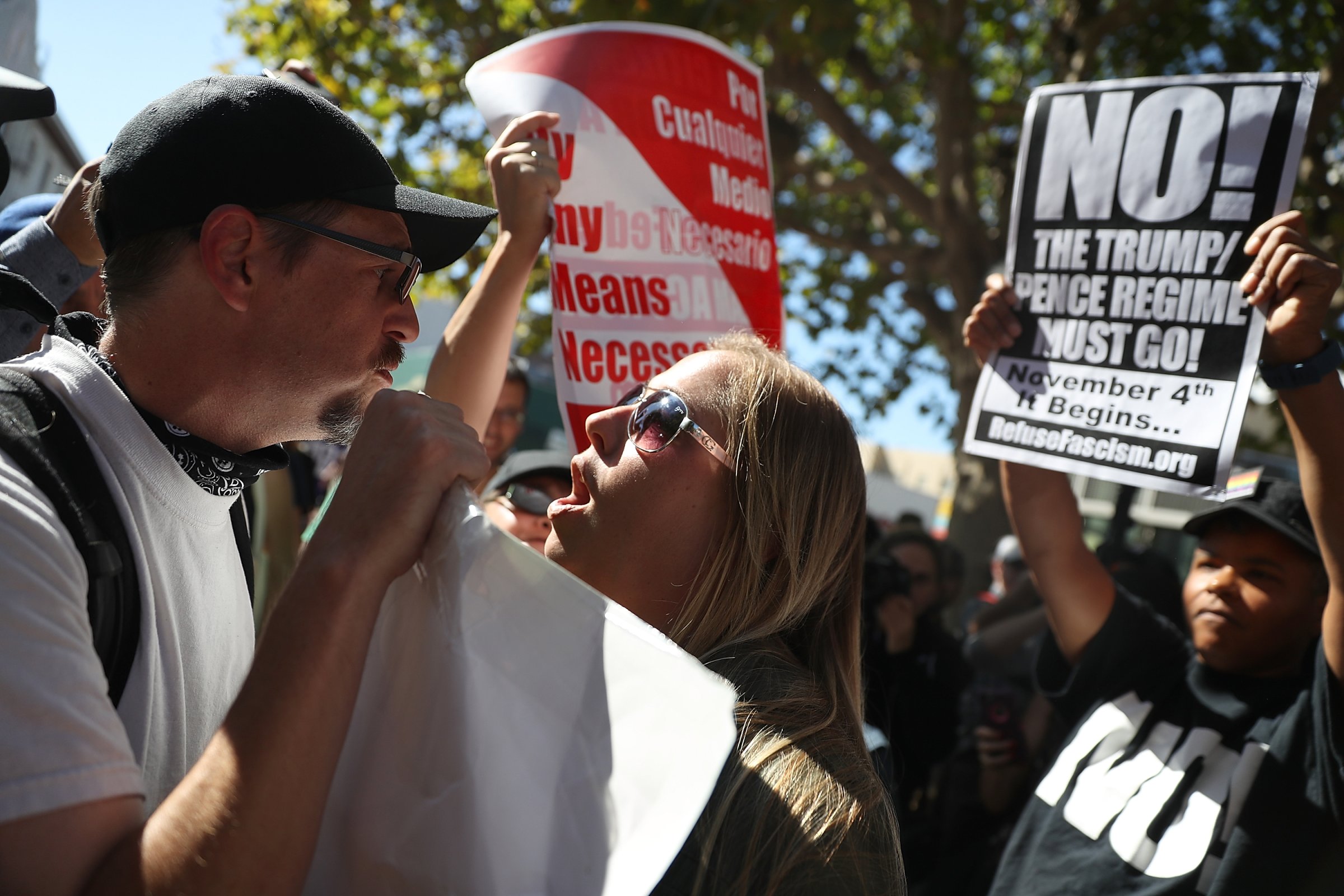
For months, the University of California, Berkeley, had prepared for a slate of conservative speakers to arrive on campus for “Free Speech Week.” The school was ready to spend more than a million dollars on security amid concerns that protesters from both left and right would show up and become violent during the four-day event planned for late September. In the end, almost all the speeches were canceled due to logistical issues and safety concerns. And the one appearance that went on Sunday ended without a clear indication of what had been accomplished.
Controversy that has rocked Berkeley for much of the year began when anti-fascist protesters stopped a planned speech by the right-wing provocateur Milo Yiannopoulos in February. The former Breitbart employee was a driving force behind “Free Speech Week” at Berkeley, along with a conservative student organization, and he vowed to appear on campus in spite of the cancellation. He did arrive, but few people could hear anything he said.
Security was intense, with scores of police officers and barricades surrounding the historic Sproul Plaza where Yiannopoulos planned to appear. No one was allowed into the area with cameras or bags, and by the time he marched out at noon, only a few dozen people stood in an otherwise empty forum.
One supporter who made it through security held a sign that declared “Feminism Is Cancer,” echoing the firebrand’s own rhetoric. Another held a sign that said “Stop Liberal Intolerance.” For most onlookers — including hundreds of people stationed behind barricades half a football field away, along with most of the media — those were the only discernible words. The university prohibits private citizens from using amplified sound in the plaza. And Yiannopoulos did not appear to spend much time speaking. He signed autographs and posed for selfies. About 20 minutes later, police escorted him away.
Hundreds of people did show up to protest on the streets outside, many of whom did not appear to be students. The university has become a flashpoint in debates over free speech that are building far beyond the campus, with conservatives arguing that their viewpoints are stifled at liberal universities — and liberals accusing right-wingers of using the words “free speech” as cover for spreading racist and sexist ideas. Whether Yiannopoulos should have any platform at Berkeley at all has become a divisive question in the community. On Sunday, people arrived with signs like “Milo Has a Right 2 Speak,” and on the other side, “Shut Down Milo.”
Supporters came out in red “Make America Great Again” caps, with American flags draped around their shoulders. Some wore T-shirts that said “Defund Berkeley.” Others wore cameras strapped to their chests or held smartphones on selfie-sticks to capture every confrontation with liberal protesters, and there were many arguments between people on opposing sides: about discrimination and racism, about personal responsibility and systemic oppression, about who was more ignorant or more intolerant.
Protesters linked arms and chanted slogans like, “Nazi scum off our streets!” and “Right wing fascists go away! Ho ho! Hey hey!” When backers of President Donald Trump started a chant of “U.S.A.,” some responded by repeating, “Humanity first!”
Alongside those clashing in tense conversations were befuddled students getting ready for midterms, who showed up to see what all the fuss was about. When Yiannopoulos left without many people hearing his speech, some of them expressed frustration at the time and money that was going into hosting such speakers, as the university strives to demonstrate that the First Amendment is alive and well on the campus where the free speech movement began in the 1960s. “What is this, a meet and greet?” one said, from behind the barricades as Yiannopoulos signed a fan’s T-shirt.
“My tuition is going towards this,” said Berkeley freshman Nabeela Syed. “If you’re going to have a platform, use it for something more effective. At least try to explain your views.” Other students expressed frustration with the terms of the debate. “I’m so sick of the words free speech being used in this context,” said senior Victoria Berdin, “because free speech is only free speech if you’re not using it to harm other people.”
Suryah Aryaei, a junior, arrived wearing a head scarf and holding a sign that said “Muslims for Free Speech.” After Yiannopoulos had left, she engaged in heated debate with people who opposed his appearance, mostly listening rather than speaking. She tried to argue that having him on the campus was a healthy exercise, paving the way for viewpoints on the left and right to be heard without discrimination.
“If you get to the fundamental core of the First Amendment, you listen to people who vastly disagree with all preconceptions and notions you have,” she said to a small crowd who gathered to hear the exchange. “I’m not going to sit here and shut people down just because I disagree because, to be frank, that’s not fair and that’s not characteristic of America.”
A few people clapped. Some then left to follow protesters, as liberals and conservatives trailed one another through the streets surrounding the campus. Having the university become a political battleground, Berdin said, sometimes makes it seem like the place is “uninhabitable for students.”
More Must-Reads From TIME
- The 100 Most Influential People of 2024
- Coco Gauff Is Playing for Herself Now
- Scenes From Pro-Palestinian Encampments Across U.S. Universities
- 6 Compliments That Land Every Time
- If You're Dating Right Now , You're Brave: Column
- The AI That Could Heal a Divided Internet
- Fallout Is a Brilliant Model for the Future of Video Game Adaptations
- Want Weekly Recs on What to Watch, Read, and More? Sign Up for Worth Your Time
Contact us at letters@time.com